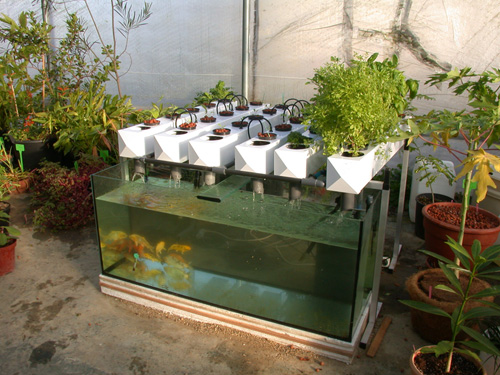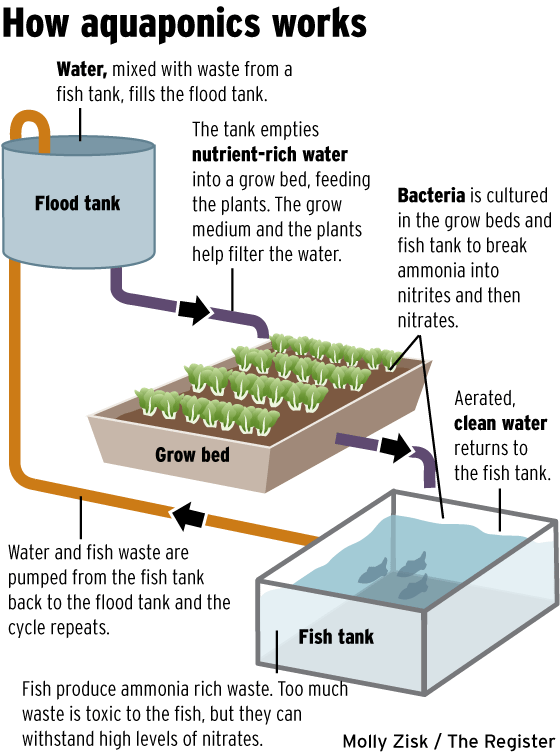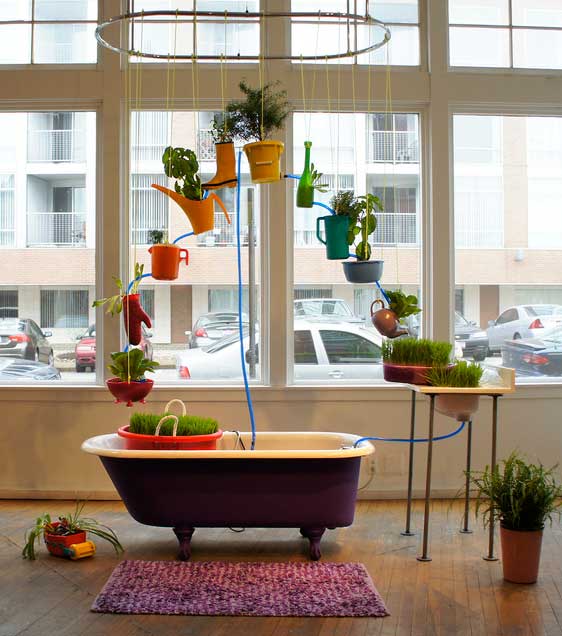Aquaponics: Aquaculture and Hydroponics
- Details
 Aquaponics is essentially the combination of Aquaculture and Hydroponics. Both aquaculture and hydroponics have some down sides, hydroponics requires expensive nutrients to feed the plants, and also requires periodic flushing of the systems which can lead to waste disposal issues. Re-circulating aquaculture needs to have excess nutrients removed from the system; normally this means that a percentage of the water is removed, generally on a daily basis.
Aquaponics is essentially the combination of Aquaculture and Hydroponics. Both aquaculture and hydroponics have some down sides, hydroponics requires expensive nutrients to feed the plants, and also requires periodic flushing of the systems which can lead to waste disposal issues. Re-circulating aquaculture needs to have excess nutrients removed from the system; normally this means that a percentage of the water is removed, generally on a daily basis.
This nutrient rich water then needs to be disposed of and replaced with clean fresh water. While re-circulating aquaculture and hydroponics are both very efficient methods of producing fish and vegetables, when we look at combining the two, these negative aspects are turned into positives. The positive aspects of both aquaculture and hydroponics are retained and the negative aspects no longer exist. Aquaponics can be as simple or as complex as you’d like to make it.
The plants extract the water and nutrients they need to grow, cleaning the water for the fish. There are bacteria that live on the surface of the growbed media. These bacteria convert ammonia wastes from the fish into nitrates that can be used by the plants. The conversion of ammonia into nitrates is often termed “the nitrogen cycle”.

Growbeds filled with a media such as gravel or expanded clay pebbles are a common method of growing plants in an aquaponic system, but there are many different methods that can be used. In fact any method of hydroponic growing can be adapted to aquaponics. Plants can be grown in floating foam rafts that sit on the water surface. Vegetables can also be grown using NFT (Nutrient Film Technique), or through various other methods using a “run to waste” style of growing. This is done by removing a percentage of the fish water each day and watering vegetables planted in different media such as coir peat, vermiculite, perlite etc.

Many different species of fish can be grown in an aquaponic system, and your species selection will depend on a number of factors including your local government regulations. Quite high stocking densities of fish can be grown in an aquaponic system, and because of the recirculating nature of the systems very little water is used. Research has shown that an aquaponic system uses about 1/10th of the water used to grow vegetables in the ground. An aquaponic system can be incredibly productive. I’ve produced 50kg of fish, and hundreds of kilograms of vegetables within 6 months in an area about the size of your average carport, 8m x 4m.
This is a system that requires no bending, no weeding, no fertilizers, and only uses about the same power it takes to run a couple of light globes.
Backyard Aquaponics
Source Here
Liked this article? Dive deeper into personal growth and wellness! Check out CrystalWind.ca for spiritual wisdom or explore AromaWorx.ca for natural well-being tips. Spread the positivity—share this with friends on their happiness journey!
Let’s Chat! Drop Your Thoughts Below! ![]()
Latest Articles
Dive into the Mystical World of the Crystal Wind Oracle Deck!
Get All the Enchanting Details Now!
NEW Expanded Boxed Edition!
Now with 58 Cards for Richer Wisdom!
Imagine a world of inspiration and healing, free for all—made possible by YOU!
Donate Now—Ignite the Magic at CrystalWind.ca!

Epilepsy - Finding A Cure
Your donation can make a difference!
Help us find a cure – donate now!
Unlock Your Light: Join Lightworkers Worldwide on CrystalWind.ca!
Follow Us!
Featured This Month
Sweet Violet
Sweet Violet Faithfulness and modesty. “I will always be true to you.” Helps... Read more
Mabon in Modern Times: Fresh Takes on the Au…
The Mabon season begins somewhere around the 21st-22nd of September and cont... Read more
Peridot: The Healer's Stone
Peridot has been used as a Power Stone for centuries. Peridot fosters emotio... Read more
The Vine: September 2nd - September 29th
The Autumnal Equinox ( Alban Elfed ) Celtic Symbol : The White Swan Read more
Sun in Virgo
An Overview of Sun Sign Characteristics for Virgo Virgo is guided by Mercur... Read more
Mabon Magic: Ideas For Fall Decoration And R…
Welcome (almost!) to Fall! We’re turning the Great Wheel once again, toward ... Read more
Watermelon Tourmaline
Synonym: Rainbow Tourmaline The watermelon tourmaline is a rare variety t... Read more
Crystals for Virgo
As the warmth of summer begins to soften into the crispness of autumn, the Sun... Read more
Virgo Mythology
The Virgo Myth In all of constellation mythology, few legends are as misund... Read more































































































































































